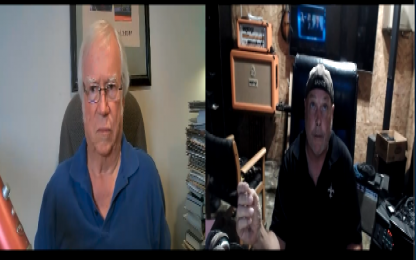Advertisement
WHAT GOES ON?
Commercial music isn’t what it seems to be, and never was.
https://www.youtube.com/watch?v=ccEhmQ0M4FY
- Category: Confession,Hypnotized,Mind Manipulation
- Duration: 18:23
- Date: 2024-01-18 16:37:13
- Tags: cultural grooming
8 Comments
Video Transcript:
When you're on in your heart, What goes on in your mind? You are tearing me apart. When you treat me so kind, What goes on in your mind? The first is an excerpt of an interview I did with Kat from the Supernatural Beatles YouTube channel. Kat is an accomplished pianist spanning 40 years and is also a music teacher, with three diplomas from three different London-based music colleges in teaching, musicology and composition. During our show, I asked Kat her opinion on whether the Beatles wrote all their own music. And the second clip comes to us from Alan Watt, who was a long-term researcher into the causative forces behind major changes in historical development. For much of his life, he was heavily involved in the music industry as a singer, songwriter and performer. He was involved in folk music, blues, pop, rock and even classical. Alan Watt was also known for his session guitar work. He played with some of the most well-known artists and groups. So I'm a music teacher now. I've been a music teacher for almost 23 years. But, you know, 25 years ago, I was still a student. And when I was a music student, I had to do a project for, I think, popular music theory. And it was listening to and critiquing all of the songs in chronological order on all 13 studio albums of the Beatles released in the UK. It was a massive undertaking to actually analyze every single song on all of those albums in chronological order. And I got to the end of that project. And what was immediately obvious to me was that it was absolutely impossible to me that they had written all of that unated. Absolutely not. I thought, wow, the Beatles must have seriously had help. How did you come to that conclusion? What was the criteria that you applied to come to that conclusion? Well, you know, some of the music was too sophisticated. Some of it was harmonically too sophisticated. Some of it was rhythmically unlikely. Some musical devices that hadn't been used for hundreds of years were present in that music. You know, cadences that haven't been popular since the medieval period suddenly turned up. It was a mixture of things. But I just thought that, well, let's stand back for a minute. I mean, I'm a music student. I've done my grade eight when I was 14. I, you know, had a fairly good grounding in music theory, even as a student. And I thought, well, if I had to write this, what would I do? How would I have coped? And I would have struggled. I mean, you can say, well, they're very talented, but that only takes you so far. There has to be some underlying skill set to fall back on. And I just didn't feel that they had it. And then, of course, that the sheer volume of it is a lot of it in a short space of time. And then, of course, there's the fact that it varies wildly in terms of its quality. It's quite consistent in the first half. And funny enough, it's actually after Billy turns up that it actually goes up and down. And I kind of think that some of it they were helped on and some of it they weren't particularly when you listen to the white album. And I mean, even George Martin said they could have had one single really good tight album, but they chose not to. And that's because Billy wanted to have 33 tracks, but he didn't quite make it, and you've got 30. But only by including everything. So it was a whole bunch of different things, but I felt pretty sure just looking at it that they must have had help. You make stars in the music industry. I hope you all realize that and are mature not to understand that. And we're presented as though someone just makes it. And nothing is further from the truth that stars are made. And music is part of entertainment. It's like tinsel town. It's the same thing. It's an entertainment industry with very professional people running it behind the scenes. And so you can take anybody really. And with the right song, the right promotion, make them into a star. But the Beatles came out of nowhere, known at the heart of them. And suddenly they were there every day. That were a lot of preparation to make that happen. Because the BBC that time remember, there was the only television station in Britain, but they promoted them from the very beginning. And really pushed them. That took contacts. That took money. And even the paper takes a lot of money to across the world and around the country. And the songs were so different. This made them tie in to the silly little songs. They've been sung before that. This boy, Geryl, love songs. The songs were different. And the words were different. It was not a backyard, a garage, a tight band. There's no doubt about that. You looked at the music schemes, the formulas in the music. You looked at the recording. And that was not done by young men who were in new three cards. So, but they came in out of nowhere, heavily promoted. Had one hit after another. And we know which were on the theater, a d'arno. A very big player in culture creation for the world. A man who came out of the Frankfurt School, who was trained as a professor. But he was a very intelligent man. He trained in culture creation. He understood a very valuable few books on it in sight. He had been a Trotskyite. And he studied how to alter whole societies through the youth. And he wrote about it too. And he was brought in to Brits and used by the British system. And an d'arno was an incredible intellect. Out of all the big players at that time, he was a tremendous intellect. If we just book through, you'll see what I mean. He thought in German. And he said that he couldn't really convey the meanings of thoughts explicitly in English because English was inadequate. But he could use a sentence and expect his listener or his father to read that sentence for a whole page without a full stop or a comma. And never lose the thread of where he was going. And he said, most of all, cannot do this today. Is it man not too long ago could follow the thread and understand it completely without losing the thread of where the actual sentence had started and can stay its thought right through. We've been dumbed down in other words. First of all, you've got to understand the prequel. All the culture out there that today is in a state of flux. It has been for a long time. It's in a state of flux by design. And we are given at least these role models to follow. The songs even to follow. You understand most of them don't write their own songs. Most singers today. And they can buy the titles and so on. They can buy the complete rights to them, but generally they don't write them. It's the guy at the top who own the whole industry, decide what's in, what's not in. And they're looking for certain lyrics in words and always with almost subliminose in them in a sense to do with sex and so on. I remember when it came down the pipeline and it came down the grapevine that gender neutral songs were now in. So you think that music is free. Music is not free at all. There's a lot of political correctness in there as to what's going to be pushed. And if you don't go along with it, your song is going to be ignored. And so you suddenly can know all these songs. And you didn't know if there was a significant or a little bit of a girl or that's a political decision. The ones higher up are all experienced and the sciences of sound and the manipulation on the human mind of particular types of sound. The effects, the emotional effects it has on people and also the words, the combination of words which can have almost a magic impact on young people who parate, generate the choruses and be vaguely understand or remember consciously some of the, I mean, the verses, but the subconsciously listens carefully and retains the subliminol you might say that almost in the background. And the act upon it, the act upon it programs them to act out and they start to change the speech, the whole copy of the lower words, the neologisms they call it, the new words. They started mimicking them the direction they came from, the question and the thing. And so yeah, it's, it's, they had meetings in 1904 on this very topic international meetings. On the use of music and one guy from New York, who was experimenting with a new type, what became really jazz, not Dixieland jazz, but the more as of discordant type jazz and he was kidnapped eventually after the Russian revolution and taken over there because they were the Russians understood the significance of music on the minds of the youth. And they worked heavily on this, they came up with the beatnick era, that was a communist invention with a associate, a particular dress code type of music and the use of marijuana for the West and use this kind of discordant music which put you into almost hypnotic state, nothing really mattered. And it would go, and it took off really well in Europe, it didn't quite make it for the US and Canada, so they had to get go back and revamp it and turn out pop music. Now guys like Martin, the work with the Beatles was really a scientist and acoustics and how it manipulated the mind goes and carefully to the types of arrangements and so on or done in the heavenly music. It was definitely done not by back street musicians or street court wonders but the people who really knew their staff and how to get particular types of emotions attached to the words that they were putting out. No, no, the point is, is that it's very hard for people to understand how you fix a record. Well, I had good teachers and I also had excellent, excellent engineers because for me, up to this time that you're hearing just record now for almost 12 to 15 years, I was being trained by engineers to fix records. And Cluity, I don't want you to come. No, I'm not going to say it. I'll do that. I'll do the question. Talking of fixing records, does a reward that nobody really ever compare that you may have fixed some of the Ringo Star tracks for the Beatles? Okay, there was an answer. The part that hurts, the real real part that hurts is that the people do not understand fixing records was a way of life. In the 60s and the 70s, it was a way of life fixing up records because 98% of the groups, self-contained groups are not on their own out. And what I did and what I was doing was going in, I was one of the few drummers who could actually go in, join the group and make the records because the record companies were paying a lot of money to make these records happen. My thing was I got along with everybody and I never went out and started hollering and complaining, knowing any songs or songs that were doing this and the other. And I just did a job. The Beatles music was just another job for me. Another job because half of the songs that I played, I played on 21 tracks of the Beatles, half of them had no drums because they kicked them out in the beginning. And the whole point is that whether you realize it or not, whether you want to believe it or not, it becomes irrelevant at this point. But you're going to find out that he's not on anything. The man made his money and his money and everything else was made by life. The man spent a million dollars promoting the Beatles. Brian Epstein spent money to promote the Beatles. And that was unheard of in the 60s to spend that kind of money to do something. Ringo took somebody else's place in that band because that's who they wanted and that's who they could control. And that's all it was. It was all about control. He looked apart that they wanted. He was the one that he chose and that's what they did. But the making of those records and the fixing of those records, 98% of them were first recorded early in England and brought to the United States to be done and fixed. That's why Mercury Records and Capitol Records, they both have Beatles albums. I did mine in the Capitol studio in New York City. I had no idea who the hell the Beatles were or anything else. I was doing a job. And that for me is the hardest thing because I've had my life threatened too many times. And at this point in my life, I don't care anymore. And it really doesn't bother me whether I talk about it or do anything else about it because I don't have to go back there or deal with it in life anymore. And I'm very proud of that. For my sake, what he did, he made his money, he did what he needed to do. He doesn't have to answer to anybody else for what he's done. And it's a shame to, you know, for things to happen this way, but it did happen. And it has happened with too many other people. There are four drummers on the Beatles music. Ringo is not one of them. But there's a lot of people on the Beatles music.










 Donate
Donate







